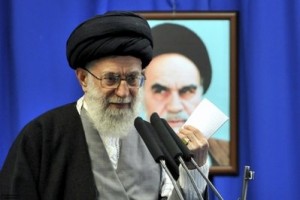 Iran’s supreme leader saluted on Friday what he termed an “Islamic liberation movement” in the Arab world, and advised the people of Egypt and Tunisia to unite around their religion and against the West.
Iran’s supreme leader saluted on Friday what he termed an “Islamic liberation movement” in the Arab world, and advised the people of Egypt and Tunisia to unite around their religion and against the West.
In his first public comments on the popular uprisings in the region, Ayatollah Ali Khamenei said Iran’s 1979 revolution, which deposed the U.S.-backed shah and established an Islamic Republic, could serve as a pattern for the Arab uprisings.
“The awakening of the Islamic Egyptian people is an Islamic liberation movement and I, in the name of the Iranian government, salute the Egyptian people and the Tunisian people,” Khamenei told worshippers at Friday prayers in Tehran.
Both Israel and the United States are concerned about the possibility of the Egyptian uprising taking on an Islamist ideology and would not like to see Iran’s influence increase in the region as Arab states distance themselves from Washington.
Egypt’s Muslim Brotherhood has portrayed itself as only part of a broad popular revolt. It has a mainly lay leadership, unlike in Iran, and backs democratic pluralism. It has no plans to run for Egypt’s presidency, a group leader said on Friday.
The 71-year-old Khamenei dismissed as “lies” any suggestion that Iran wanted to interfere in the region’s affairs.
“The awakening of people is a war between two wills, the will of the people and the will of the enemies of the people,” said Khamenei, who condemned the huge street protests that erupted in Iran after the disputed re-election of hardline President Mahmoud Ahmadinejad in June 2009.
Khamenei called on the Egyptian army to back the protesters and “focus its eyes on the Zionist enemy,” a reference to Israel which fears a change of regime in Egypt could jeopardize its 1979 peace treaty with its neighbor to the west.
“If Egypt halts its alliance with (Israel) and takes its real position, what a great event will happen in the region. All the late Imam’s prophecies will come true,” he said, referring to Ayatollah Ruhollah Khomeini, the leader of Iran’s revolution who called for popular uprisings throughout the Islamic world.
CALL ON GOD
In a sermon punctuated with chants of “Death to America” from a congregation that included Ahmadinejad and other important political and military figures, Khamenei said: “Our revolution has been able to inspire hope, to set an example.”
Addressing the people of the Arab world — a predominantly Sunni Muslim region which has historically viewed Persian Shi’ite Iran as an adversary — he cautioned them to beware of Western influence subverting their revolutions.
Without naming Mohamed ElBaradei, the former head of the U.N. nuclear agency, who claims endorsement from disparate opposition groups from secular students to the Muslim Brotherhood, Khamenei warned Egyptians against compromising with any leader who might win Western approval.
“They are trying to replace one spy with another. They are trying to focus the spotlight on certain faces to impose the rule of the spies on you. Do not accept anything less than an independent popular regime that believes in Islam,” he said.
“If they (protesters) are able to push this through then what will happen to the U.S. policies in the region will be an irreparable defeat for America,” he said, telling Arab peoples he was their “brother in religion.”
“I call on God to help you and bring about victory for you. I feel proud for your awakening.”
While Iranian officials have lauded the protests for taking inspiration from Iran’s revolution, Iranian opposition figures say the events have more in common with the 2009 anti-Ahmadinejad demonstrations, which were stamped out by a government that denied the presidential election was rigged.
After Friday prayers, several hundred Iranians staged a demonstration of solidarity with the Egyptian protesters, burning pictures of Egyptian President Hosni Mubarak and shouting slogans against Israel and the United States. Reuters

Leave a Reply
You must be logged in to post a comment.